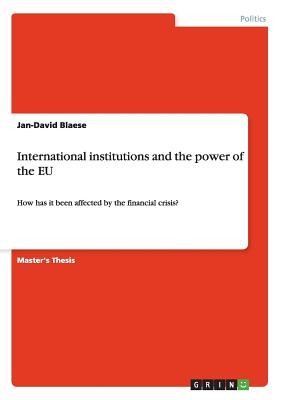
- We will send in 10–14 business days.
- Author: Jan-David Blaese
- Publisher: GRIN Publishing
- ISBN-10: 3656206821
- ISBN-13: 9783656206828
- Format: 14.8 x 21 x 0.4 cm, minkšti viršeliai
- Language: English
- SAVE -10% with code: EXTRA
International institutions and the power of the EU (e-book) (used book) | bookbook.eu
Reviews
Description
Master's Thesis from the year 2011 in the subject Politics - International Politics - Topic: European Union, grade: 1,7, University of Bonn, language: English, abstract: "Power is shifting at the global level but it is doing so unevenly across different dimensions." The statement of Giovanni Grevi describes the phenomenon of power shift. Such shifts happened multiple times throughout history. But they do not occur frequently and are often connected with use of force. At present there is a power shift from the western industrialized states, e.g. from member states of the European Union (EU), to Asian states, in particular China. This shift builds on the fast economic growth of the emerging countries. Yet, in spite of this growth, it is disputed to what extent the rise of these economies already transcended into power and how it will develop in the future. The recent global financial and economic crisis was the worst one in post World War II history, because it led to an economic downturn with unprecedented global depth. The crisis emerged in the United States (US) and then spread to the EU and as well to other countries. It led to steeply rising public debt levels in western industrialized states. Many scholars, like Giovanni Grevi and Roger C. Altman, are of the opinion that the crisis accelerated the recent shift of power. During this course of time, states like China or India extended their participation within global economic governance foras, such as the International Monetary Fund (IMF) or the G20. This raises the question how the power of the European Union within these international institutions was affected by the crisis? The purpose of this thesis is to research this question.
EXTRA 10 % discount with code: EXTRA
The promotion ends in 21d.19:16:54
The discount code is valid when purchasing from 10 €. Discounts do not stack.
- Author: Jan-David Blaese
- Publisher: GRIN Publishing
- ISBN-10: 3656206821
- ISBN-13: 9783656206828
- Format: 14.8 x 21 x 0.4 cm, minkšti viršeliai
- Language: English English
Master's Thesis from the year 2011 in the subject Politics - International Politics - Topic: European Union, grade: 1,7, University of Bonn, language: English, abstract: "Power is shifting at the global level but it is doing so unevenly across different dimensions." The statement of Giovanni Grevi describes the phenomenon of power shift. Such shifts happened multiple times throughout history. But they do not occur frequently and are often connected with use of force. At present there is a power shift from the western industrialized states, e.g. from member states of the European Union (EU), to Asian states, in particular China. This shift builds on the fast economic growth of the emerging countries. Yet, in spite of this growth, it is disputed to what extent the rise of these economies already transcended into power and how it will develop in the future. The recent global financial and economic crisis was the worst one in post World War II history, because it led to an economic downturn with unprecedented global depth. The crisis emerged in the United States (US) and then spread to the EU and as well to other countries. It led to steeply rising public debt levels in western industrialized states. Many scholars, like Giovanni Grevi and Roger C. Altman, are of the opinion that the crisis accelerated the recent shift of power. During this course of time, states like China or India extended their participation within global economic governance foras, such as the International Monetary Fund (IMF) or the G20. This raises the question how the power of the European Union within these international institutions was affected by the crisis? The purpose of this thesis is to research this question.


Reviews